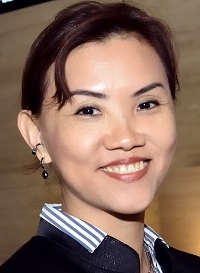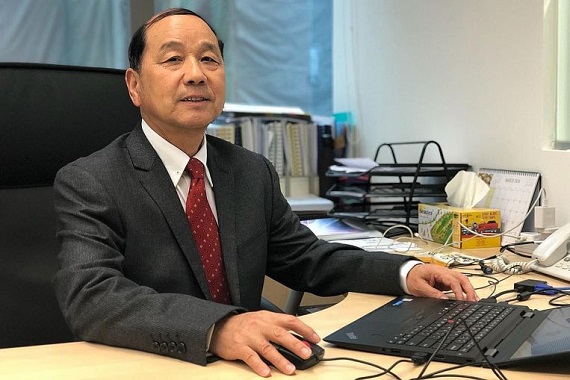 This article by Jennifer Tan (left, Director, Research & Products, Equities & Fixed Income, at the Singapore Exchange) was published in SGX's kopi-C: the Company brew series on 22 June 2018. The article is republished with permission.
This article by Jennifer Tan (left, Director, Research & Products, Equities & Fixed Income, at the Singapore Exchange) was published in SGX's kopi-C: the Company brew series on 22 June 2018. The article is republished with permission.
|
An avid tea drinker, chemicals industry veteran Liu Jing Fu usually unwinds at the end of a long day with a steaming, amber-coloured brew. He sips black tea during the long winter months, and green tea in spring or summer.
"I spend a lot of time thinking about business strategy and reading," said the Executive Director and Chief Executive Officer of SGX-listed China Sunsine Chemical Holdings Ltd. |
Listed on SGX in July 2007, China Sunsine is a key player in the natural rubber industry supply chain. The specialty chemicals company - established in 1977 - started producing rubber accelerators in 1994 in anticipation of rising demand for cars and tyres.
Today, the Group is the world's largest manufacturer of rubber accelerators - with a 20% global share - and China's biggest producer of insoluble sulphur. It counts more than 65% of the Global Top 75 tyre manufacturers - including Bridgestone, Michelin, Goodyear and Pirelli - as its customers.
Its production facilities are located at Shanxian, Weifang and Dingtao in Shandong province, with a total annual capacity of 152,000 tonnes, comprising 87,000 tonnes of rubber accelerators, 20,000 tonnes of insoluble sulphur and 45,000 tonnes of anti-oxidant. It also has a centralised heating plant at Shanxian that generates steam and electricity.
Rubber chemicals are additives blended with natural or synthetic rubber during the manufacturing process. Rubber accelerators shorten the reaction time between rubber and sulphur, while for high-temperature applications, insoluble sulphur is used in place of ordinary sulphur that melts at lower temperatures. Anti-oxidants offer anti-oxidation and anti-degradation properties to boost the quality and extend the lifespan of the final product.
An estimated 90% of the consumption of rubber chemicals is associated with the automobile industry, and 70% of the output is channelled into the production of car tyres.
Established Brand
China Sunsine has a current market capitalisation of over S$760 million. In the 2018 year-to-date, its shares have generated a total return of more than 75%, outperforming the benchmark Straits Times Index and the broader FTSE ST All-Share Index's total returns of -0.9% and -1.6% respectively.
China Sunsine has recorded a profit every year since the management buy-out led by Chairman Xu Cheng Qiu in 1998. Prior to 2014, the Group chalked up net profits of 100 million yuan or below. But when China stepped up its pollution crackdown in 2014, the Group's earnings surged to around the 200 million yuan level between 2014 and 2016. Last year, when the central government's enforcement actions resulted in a further reduction of rubber chemical capacity, the Group generated a record full-year net profit of 340 million yuan.
Between 2013 and 2017, China Sunsine's earnings and revenues have increased by a compounded annual growth rate (CAGR) of 45.2% and 12.7% respectively.
The Group's balance sheet is also strong - it had zero debt at the end of 2016 and 2017, while cash and cash equivalents stood at 508.7 million yuan as at 31 March 2018, up from 499.6 million yuan as at 31 December 2017.
 We are focused on serving big-volume tyre makers and investing in automation, intelligent manufacturing techniques, and miniaturisation, as well as green production technologies. We are focused on serving big-volume tyre makers and investing in automation, intelligent manufacturing techniques, and miniaturisation, as well as green production technologies.- Liu Jing Fu |
"We are focused on serving big-volume tyre makers and investing in automation, intelligent manufacturing techniques, and miniaturisation, as well as green production technologies," Liu said.
Despite grappling with intense competition and volatile raw material prices, China Sunsine continues to play to its key competitive strengths, he added.
"We have a wide product range that is reliable, of high quality, and satisfies our customers' needs - in other words, our branding is well-established," Liu said.
"At the same time, our scale keeps our cost of production low. We've also invested heavily - since the early years - in research and development, safety production, as well as environmental protection measures. All of these factors have helped cement our market leadership."
Barriers to entry are high in this industry, which remains tightly regulated by China's stringent environmental protection laws. The Group has benefitted from the government's increased enforcement action against competitors that have failed to meet strict regulatory standards.
"Such actions taken by the government have led to numerous factory closures and impacted industry output. This, in turn, has raised average selling prices as producers have factored in environmental protection costs, and is driving consolidation in the industry," Liu said.
While overall average selling prices (ASPs) jumped by 30% in 2017 over the previous year, this uptrend may not be sustained over the longer term.
"We believe the price of rubber chemicals is likely to normalise gradually, with the bigger players investing more in environmental protection and safety production measures, and some smaller players eventually complying with regulations and resuming their production," he added.
Global peers in the rubber accelerator segment include Tianjin Kemai, with an annual capacity of 51,000 tonnes, and Yanggu Huatai, with an annual capacity of 30,000 tonnes. This compares with China Sunsine's annual capacity of 87,000 tonnes.
Among insoluble sulphur producers in the country, both Yanggu Huatai and Wuxi Huasheng have an annual capacity of 10,000 tonnes each, versus China Sunsine's 20,000-tonne annual output.
This year, the Group is slated to add a 10,000-tonne high-grade TBBS rubber accelerator production line, and a 10,000-tonne insoluble sulphur line. Further capacity expansion is possible with land and ready infrastructure in place, along with its cash hoard of more than 500 million yuan.
| ♦ Burgeoning Demand | ||||||||||||||
|
Looking ahead, given its focus on production technology, innovation, and R&D, China Sunsine remains optimistic about its performance, Liu said.
"Being the world's largest auto market, and with the Chinese population's increased purchasing power, we believe China's car sales will remain robust over the next few years," Liu added. |
||||||||||||||
Financial results
| Year ended 31 Dec (RMB 'm) |
2017 | 2016 | 2015 |
| Revenue | 2,738 | 2,037 | 1,859 |
| Gross Profit | 788.1 | 54.4 | 492.0 |
| Net Profit | 341.3 | 221.7 | 195.2 |
| Quarter ended 31 Mar (RMB 'm) | 1QFY2018 | 1QFY2017 |
yoy chg |
| Revenue | 856.9 | 574.6 | 49% |
| Gross Profit | 298.8 | 140.0 | 113% |
| Net Profit | 149.5 | 57.2 | 161% |
Source: Company data
| Outlook & Risks | ||
|
||
China Sunsine Chemical Holdings Ltd
Listed on SGX on 5 July 2007, China Sunsine Chemical is a specialty chemical producer selling accelerators, anti-oxidant, vulcanising agents and anti-scorching agents. It is the largest producer of rubber accelerators in the world and has become the largest producer of insoluble sulphur in the People's Republic of China. It serves more than 65% of Global Top 75 tyre manufacturers, including Bridgestone, Michelin, Goodyear, Pirelli, Sumitomo, Yokohama, Hankook, as well as PRC tyre giants such as Hangzhou Zhongce, GITI Tire and Shanghai Double Coin Tyre. China Sunsine distributes its products under its own "Sunsine" brand, which has been accredited as a "Shandong Province Famous Brand".
For the company's financial results for the quarter ended 31 March 2018, click here.
The company website is: www.chinasunsine.com.
The ccompany's Stock Facts page is here.







